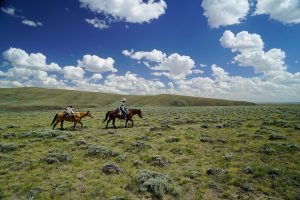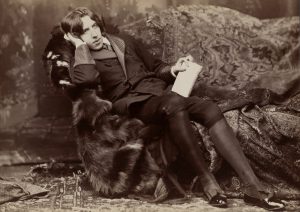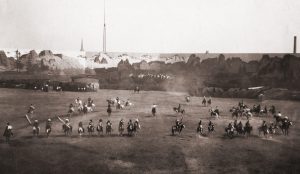The Man From the Rio Grande: A Biography of Harry Love, Leader of the California Rangers Who Tracked Down Joaquín Murrieta
by William B. Secrest, Arthur H. Clark Co., Spokane,Wash., 2005, $34.50.
In 1853 when the head of Joaquín Murrieta first went on exhibition, the Sacramento Union ran an article explaining that this was done for three reasons: to allow those who knew him to identify him so that the California Rangers could collect their rewards; to gratify Californians eager to see the “most celebrated and infamous outlaw of his age”; and to discourage others from aiding the late bandido’s gang members or from otherwise turning to a life of crime. The Rangers were indeed rewarded for the capture and beheading of Joaquín Murrieta (last name spelled many ways), none more so than Captain Harry Love, and the head of Murrieta was exhibited in California for more than 50 years. Those readers who hunger for well-researched, entertaining outlaw-and-lawman history will delight in William Secrest’s two chapters devoted to the Murrieta-Love relationship—“The Long Trail to Cantua Creek” and “Heads You Win.” But there is a lot more to learn about Love, who, like the infamous bandit he nailed, has been a controversial and mysterious figure in Western lore.
In his classic 1994 book Lawmen & Desperadoes: A Compendium of Noted, Early California Peace Officers, Badmen and Outlaws, Secrest devoted a few pages to Love that whetted the appetites of some readers and apparently that of the author as well. Now comes this satisfying 303- page biography, complete with a title that will surprise many people who have previously only associated the elusive Love with California. Back in the middle of the 19th century, though, Love was a well-known figure for having served as an Army courier and express rider in Texas, Mexico and New Mexico during the Mexican War and for his exploration of the Rio Grande in 1850. After achieving a degree of frontier fame with his Rio Grande expedition (which encouraged more settlers along that river), Love answered the call to California, where he achieved far greater fame by pursuing outlaws rather than gold.
“It goes without saying that without Murrieta there would not have been a Harry Love as we know him,” writes Secrest in his introduction to The Man From the Rio Grande. “It was both the high point and the turning point of his life.” Yet the author wanted to give a more complete picture of Love, for even as more information emerged about California’s most famous bandit, Love remained “an enigmatic and shadowy figure.” The author adds: “Love was a mysterious figure who appeared when needed, then faded into obscurity. It turns out that even the meager biographical information provided in newspaper obituaries were largely false.” If Love was “a gallant fellow,” as one Army officer described him during the Rio Grande days, he might be deemed a destitute, drunken failure at the end, which came in an 1868 shootout with a man in the employ of Love’s estranged wife. “Certainly, no semblance of the gallant Harry Love of an earlier time had been present that tragic day,” writes Secrest near the end of a book that even non-Californian outlaw-lawman history buffs can love.
Originally published in the June 2006 issue of Wild West. To subscribe, click here.




